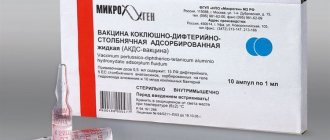The newborn’s body is very weak, especially the baby’s immune system, so any infection is dangerous for the baby during this period. To protect children from terrible infectious diseases, vaccinations are carried out. Does my child need to be vaccinated? Why is vaccination needed? What types of vaccines are there? What reactions to vaccinations may children have... Read about this and much more in our article.
Types of vaccines
Vaccination is an effective way to prevent infectious diseases of various etiologies, which consists of introducing a weakened or dead virus into the body in order to form acquired immunity.
Modern medicine uses the following types of vaccines:
- live, produced on the basis of living weakened microorganisms. These include BCG (tuberculosis), vaccinations against measles, mumps, rubella, polio (administered through the oral cavity).
- dead (inactivated), made by neutralizing pathogens. Among them are polio (IPV), pertussis (part of DTP) injections.
- synthetic, produced through genetic engineering synthesis - against hepatitis B.
- toxoids obtained by neutralizing pathogen toxins (most often formaldehyde). These are components of DTP against tetanus and diphtheria.
There are also polyvaccines consisting of several provoking viruses at once, which can significantly reduce the total number of vaccinations. These include DPT (whooping cough, diphtheria, tetanus), Tetracok (whooping cough, diphtheria, tetanus, polio), Priorix, or CPC (whooping cough, mumps, rubella).
The Ministry of Health of the Russian Federation has developed and approved a national calendar of preventive vaccinations, according to which an individual vaccination plan is drawn up for each child. In addition to scheduled injections, injections are administered for epidemic indications, for example, against influenza, rabies and others.
How the vaccine works
Vaccination is the main method of disease control, allowing one to radically influence the epidemic process and manage the disease. The principle of vaccination is based on the ability of the immune system to produce antibodies in response to the introduction of live or inactivated microbes. The produced immunoglobulins are stored in the body, and when strains of infectious agents penetrate, they are recognized and neutralized. This prevents the development of the disease or ensures its mild course.
Vaccinations only protect against the infections they are directed against. The duration of their action depends on the type of vaccine, so a number of injections are repeated over time.
Let's sum it up
Of course, vaccinations protect our children and us from severe and serious diseases, as well as possible complications after an illness. However, you should not mindlessly follow the vaccination calendar. It is important to give the vaccine only to a healthy child. If your child was born weak or has any congenital health problems, consult several specialists about vaccinations. In this case, it is better to refuse the administration of live vaccines.
Every young mother should answer the question of whether it is necessary to have mandatory vaccinations for a child or to refuse vaccination. Approach this issue with all responsibility, since the health and future of the baby depends on your decision.
Vaccinations for children - pros and cons
The question of whether to vaccinate a child causes a lot of controversy among parents. Many mothers and fathers have the opinion that vaccination is harmful because it destroys the baby’s innate immunity. They give the following arguments against:
- there is no absolute guarantee that the child will not catch the infection even if the microbe that causes it is introduced;
- the immune system weakened by introduced infectious agents does not protect against other diseases;
- toxic substances in the vaccine have a harmful effect;
- the immune system of a breastfed newborn is protected by maternal antibodies contained in milk;
- the development of an allergic reaction and other serious complications, including death, is possible.
In reviews of vaccinations performed, parents note the poor quality of administered medications, non-compliance with storage conditions (temperature conditions), and violation of injection technique. Medical professionals can refute many of the arguments presented.
Vaccination supporters advocate the introduction of mandatory vaccinations, believing that they keep children healthy. They prove their answer to the question: why are vaccinations needed with the following arguments:
- form adaptive immunity against dangerous and fatal diseases;
- universal vaccination prevents mass diseases and the development of epidemics of dangerous infections;
- The absence of a vaccination certificate or immunization card will cause difficulties when enrolling in a kindergarten, educational institution, camp, or when applying for travel abroad.
The vaccine does not provide lifelong immunity, but it prevents the development of possible dangerous complications, for example, infertility in boys after mumps, arthritis after rubella measles, etc.
About immunity
Immunity is the ability of the human body to withstand the effects of any external factors, be it foreign agents (protein living “creatures” - bacteria, viruses, fungi) or substances, for example, “poisons” of various origins that we eat or breathe. Conventionally, immunity can be divided into nonspecific, or general, and specific.
The protective forces of general immunity (lysozymes, interferons, T-lymphocytes and B-lymphocytes, etc.) fight against all “violators” of boundaries without exception. The protective forces of specific immunity are selective. These are mainly antibodies - immunoglobulins J and M, which are formed either after a previous illness, or after vaccination, or are introduced into the body artificially (serum). Routine vaccination (vaccinations) against particularly dangerous infectious diseases is the subject of our conversation today.
The army of general immunity is quite extensive: these include the central organs of immunity (the thymus gland, palatine tonsils, etc.), and the human skin, and its mucous membranes, and special protective proteins in the blood, and much more.
Unfortunately, for many decades, domestic doctors have been actively working to promote only specific immunity, that is, vaccinating children against specific diseases. Without disputing this state of affairs, it is necessary to understand: in a child with a high level of general immunity, not only the risk of post-vaccination complications is reduced, but also the very chance of catching the infectious disease against which he is vaccinated.
How to increase general immunity in a child of the first year of life
Long-term breastfeeding (plus nutritious and varied nutrition for the nursing mother herself).
Age-appropriate introduction of complementary foods. It should begin no earlier than 4-6 months of life. Otherwise, the child’s body experiences an unbearable load on the digestive system (the necessary reflexes have not yet been formed and there are no necessary enzymes), on the kidneys, liver and intestines (they cannot cope with the “processing” of new food and the removal of toxins).
Normal environmental conditions in the house. Less synthetics, more natural materials (furniture, clothes), no dust collectors (heavy curtains, high-pile carpets, large soft toys).
Regular ventilation and maintaining minimal cleanliness: there is no need to carry out general cleaning every day, but the absence of a layer of dust at least on children's things and toys is desirable. Smoking is prohibited in the house with a baby!
Tempering procedures, massage, gymnastics. Any training of the body (massage and gymnastics activates the work of hematopoiesis, heart, blood vessels, muscles) makes the immune system stronger as well. Load is useful, but overload is unnecessary.
Fortunately, this is easy to determine in a small child: as long as he is having fun, there is no unnecessary overexertion, although it may seem to us that the baby has been tired for a long time... Or vice versa: an always active baby, already trained by gymnastics or hardening, suddenly begins to resist - which means it makes sense to stop for now on what has been achieved.
What is the point of vaccination?
Vaccination does not protect a child one hundred percent from infectious diseases, but it can significantly reduce the risk of disease in children in the first year of life. This is very important - the smaller the child, the weaker his immune system. If the baby does get sick, then vaccination done in advance will help the disease progress in a milder form, and serious complications and consequences will also be excluded. Total vaccination (covering more than 92% of the country's population) makes it possible to avoid epidemics on a national scale.
There is still a widespread belief that vaccination is a one-time procedure. The main thing is to do it for the child. This is not true: it is necessary to make sure that the baby develops adequate immunity in response to the vaccine. Therefore, the vaccination schedule should be like this:
- Preparing for vaccination.
- Vaccination course.
- Checking the effectiveness of vaccination, for example using a blood test for antibodies.
There is an opinion that breastfeeding protects the baby from all diseases during the first 6-9 months. This is only partly correct: without a doubt, the child’s overall immunity in this case is much higher. However, in what quantity antibodies “flow” into the child through mother’s milk is unknown. Therefore, there is no absolute guarantee of specific protection for the baby’s body during breastfeeding.
For vaccinations that are given once (measles, mumps), it is necessary to check the effectiveness, regardless of whether your child has an individual vaccination schedule or a standard one. Using an antibody blood test, you can find out whether the vaccine has done its job. If the antibody titer is high, it means that the vaccination was not in vain.
With three-time vaccinations (DTP and polio vaccines are administered three times in a row, with an interval of 45 days), the probability that immunity to diseases exists is about 99%. A large number of memory cells accumulate in the body, which “keep” the level of antibodies high. Therefore, there is no particular point in testing for antibodies after the first vaccination.
Blood tests for antibodies and immune status are quite expensive; In addition, the child's blood is taken from a vein. Free tests in public medical institutions are done very rarely, for exceptional indications.
A special case
Even if you are an ardent opponent of vaccinating all children, including your own, it makes sense to sometimes reconsider your positions, in accordance with the circumstances. Have you moved to a new apartment and, for lack of better places to relax, are you walking under the windows of a tuberculosis dispensary? It is safer for all family members to get the BCG vaccine. Or at least test the little ones for the Mantoux reaction.
It is known that children who are weakened and often suffer from colds need vaccination no less than others. But it is quite difficult to implement: in order for the vaccination to fulfill its purpose, the child must be absolutely healthy at the time of vaccination. There are children who are almost never “absolutely healthy”: one cold ends, and now another begins...
It turns out to be a vicious circle: it’s scary to vaccinate, and it’s scary not to vaccinate. How to find the gap between common diseases to get vaccinated? In parallel with increasing general immunity, it is necessary to strengthen specific immunity - with the help of a well-thought-out individual vaccination calendar, under the supervision of a competent immunologist.
Determination of immune status is a detailed description of the general state of the child’s immunity. There is an urgent need for such research if your baby is constantly sick, even while breastfed! After the examination, it is necessary to consult with an immunologist - only a specialist can correctly “read” the test results.
Should children be vaccinated: the opinion of Dr. Komarovsky
Children's doctors believe that vaccination is mandatory. The same opinion is shared by the famous pediatrician Evgeniy Olegovich Komarovsky, who enjoys great authority among parents. He claims that the vaccine does not protect the body 100% from infection, but the disease will be easier and the child will endure it without problems. The doctor does not rule out reactions to the injection and possible complications. To avoid this, he recommends that parents strictly adhere to the following reminder:
- vaccination according to schedule;
- give the injection only to a completely healthy child;
- do not introduce new complementary foods several days before vaccination;
- the day before the procedure, limit the baby’s food intake to avoid overloading the digestive tract;
- do not eat an hour before and after administration of the drug;
- maintain a drinking regime: at least 1.5 liters of water per day.
After the injection is given, you should refrain from visiting crowded places and avoid overheating and hypothermia.
The Russian Orthodox Church also expresses its arguments for vaccination in the book “Orthodox View on Vaccine Prevention” (published in 2007). With the blessing of Patriarch Alexy II, mass immunization against influenza was carried out in St. Petersburg in 2004.
The decision whether to vaccinate a child or not rests solely with the parents. However, when refusing vaccination, they must realize that they are responsible for the baby’s health.
An unvaccinated body is not protected from dangerous infections, and if it encounters a real natural virus, it will have to fight on its own. It is difficult to judge which side will win. Parents must remember that it is not the disease itself that is dangerous, but the severe complications.
Where did the anti-vaccine movement come from and where is it leading?
The anti-vaccination movement emerged simultaneously with the advent of vaccination. The first vaccinations began in the 19th century, and then people began to resist this phenomenon. This reaction was a response to the emergence of new, unknown and “terrible” manipulations with a person. Afterwards, ordinary people began to feel calm about vaccines and even rejoice at their appearance, because they saved them from dangerous diseases. Thanks to vaccinations, children were able to safely go to school without fear of contracting polio, measles or diphtheria.
In Russia, the anti-vaccination movement began to gain momentum in the 1980s. The popular newspaper Komsomolskaya Pravda published an article by Galina Chervonskaya, a famous opponent of vaccinations. Thousands of readers believed the information presented in the material, and negative opinions about vaccinations grew like a snowball. Most adherents of the anti-vaccination movement are not doctors, do not operate with reliable facts, and rely only on unproven hypotheses.
In foreign countries, the anti-vaccination movement emerged after vaccination was made mandatory for everyone. One gastroenterologist gave a speech about how vaccinations contribute to the development of autism. People believed this argument. Afterwards, scientists repeatedly conducted studies to confirm or refute this information. She did not receive confirmation.
When people begin to refuse vaccinations en masse, this can have serious consequences. If the number of unvaccinated people exceeds the number of vaccinated people, the risk of an “outbreak” of infections increases, as in the 1980s in Russia, due to refusal to vaccinate, there was a massive spread of diphtheria. Such events are very dangerous for people’s lives; they threaten the development of serious pathologies in the body or even death. First of all, young children, people with weakened immune systems and the elderly are at risk. Therefore, all mothers should carefully weigh the pros and cons of vaccinating their children.
Vaccination calendar: what is it and is it worth following?
As mentioned above, each country has approved a list of vaccines that are mandatory for administration. The vaccination calendar is compiled based on the specifics of the region of residence, living conditions and is approved by the Ministry of Health. It looks like this:
| Name | Age | Action |
| Viral hepatitis B | the first 12 hours of a baby's life first month second month twelve months 13 years old - provided that it has not been done earlier | Protects against hepatitis virus. Hard to bear. A refusal for medical reasons is possible up to 5 years, provided that it was not done in the maternity hospital. |
| BCG (Bacillus Calmette-Guerin) | 3-7 days after birth 7 years – repeated revaccination | Protects against airborne tuberculosis. |
| DPT+ poliomyelitis | 3 months 4.5 months 6 months 18 months, 7 years, 14 years – repeated revaccination | Against diphtheria, whooping cough, tetanus Poliomyelitis is an infectious disease for which there is no effective cure, so this injection is very important. |
| Haemophilus influenzae infection (Pentaxim, Hiberix, Act-Hib) | 3 months 4.5 months 6 months | Protects against Haemophilus influenzae - meningitis, pneumonia, otitis and other infections |
| Pneumococcal infection (Prevenar) | 2 months 4.5 months 15 months | Protects against the most common pneumococcal viruses |
| Measles, rubella, mumps | 12 months | Protects against measles, rubella, mumps (mumps) virus |
| Polio | 20 months, 14 years – repeated revaccination | |
| Revaccination against measles, rubella, mumps | 6 years | |
| Rubella | 13 years | especially recommended for girls |
The calendar may include additional injections: against tick-borne encephalitis, herpes zoster, hepatitis A and others. They are usually prescribed in regions with a low epidemic threshold.
It is very important to vaccinate a child in the first year of life, since vaccines protect the infant’s fragile body from dangerous diseases.
Doctors say that it is advisable to comply with the deadlines established by the calendar, since the maximum effectiveness of administering drugs during the specified age period has been clinically proven and scientifically substantiated. If there are no contraindications, vaccination should be carried out according to the plan approved for each specific baby.
Adjustments to the schedule are made taking into account the characteristics of the baby. You cannot get vaccinated if you are sick or feeling unwell. In a one-month-old baby, the reasons for possible changes include weight.
If the vaccine is administered later, it will not affect your health in any way. After the medical outlet is removed, vaccination resumes; the main thing is to observe the established intervals between injections. It is permissible to combine some drugs, for example, DTP is often combined with hemophilus influenzae and polio.
Interesting topics
- The chickenpox vaccine is not mandatory, but you can get it if you wish. Find out more information about the chickenpox vaccine and indications for its use.
- The BCG vaccination is very important for our country, because it protects children from a terrible disease - tuberculosis.
- The Mantoux test shows whether the body can resist tuberculosis.
- You can also find out what the Infanrix Hexa vaccine is for.
Girls, how do you feel about vaccinations? Tell us in your comments, have you completed all the required vaccinations for your baby? And if not, why not?
Which vaccines are mandatory?
Why are a number of vaccinations necessary for children? This question is often asked to pediatricians by parents who doubt the benefits of vaccination. When children enter a preschool educational institution, they must provide a certificate of preventive vaccinations. Immunoprophylaxis of children in this case is confirmed by legislative acts. On their basis, admission to the institution is carried out.
What vaccinations are needed for kindergarten? The list of required vaccines for a preschooler is as follows:
- DPT;
- polio;
- Hepatitis B;
- BCG, Mantoux;
- against measles, rubella, mumps;
- against pneumococcal infection;
- seasonal flu shot;
- from chicken pox.
If parents are categorically against vaccination, then when enrolling their child in kindergarten, they must provide a documented official refusal of medical intervention indicating possible negative consequences.
At the same time, if there is an outbreak of an epidemic or a quarantine is declared, an unvaccinated child may be temporarily prohibited from visiting a child care facility.
Don’t get vaccinated: the vaccination failure of Putin’s poisoners and the new initiatives of the Gintsburgs
Vaccination in Moscow and throughout the country is seriously stalled. Nobody began to listen and heed Putin’s instructions. Nobody believes him anymore. Conscious citizens are in no hurry to become part of the experiment (the third phase of Sputnik V tests officially ends in May 2021), and even the administrative resource turned on to the maximum does not help Putin’s “coronavirus party.”
Meanwhile, the global contours of this project are emerging more and more clearly - NICEM named after. Gamaleyi (head Ginzburg in the photo) entered into a memorandum of cooperation with the notorious Anglo-Swedish biopharmaceutical company AstraZeneca to develop a global vaccine of a single type. At the same time, the virus is constantly mutating, which casts doubt on the effectiveness of vaccinations, and post-vaccination complications are being recorded all over the world.
Possible reaction to the vaccine
Very often, after a prophylactic injection is given, the body responds in the form of an increase in temperature to febrile values, lasting up to 3 days, redness, swelling and hardening of the injection site, restless behavior, moodiness, deterioration in general well-being, sleep disturbance, appetite, rashes on the skin. They usually appear after the administration of the DTP vaccine, Priorix (against rubella).
In most cases, this normal physiological reaction of the body to the introduction of foreign agents indicates the active functioning of the baby’s immune system. Lack of reaction is also normal.
How to help in such cases? Is it necessary to reduce a child’s fever after vaccination? Yes, it is necessary to remove hypertemia with antipyretic drugs Nurofen, Calpol, Tsefekon (suspensions, tablets, suppositories are suitable). For redness and itching, antihistamines Zyrtec, Fenistil, Suprastin should be given.
When it is not possible to bring down the high temperature and eliminate other symptoms, you need to consult a doctor.
Contraindications
Before vaccination, the doctor orders a general blood and urine test, a consultation with a specialist (neurologist), conducts a thorough examination, and asks the parents for information about the baby’s general well-being, reactions to vaccinations already performed, and possible allergies. If there are no visible contraindications, the child is referred for an injection.
In some cases, a medical exemption is given, which lasts from a month to a year or more. There are temporary and permanent (absolute) contraindications.
Absolute contraindications include:
- severe reaction/complication to a previously administered vaccine;
- weakened immunity;
- neoplasms of various etiologies;
- weight less than 2000 g for BCG vaccination;
- allergy to aminoglycosides, yeast;
- afebrile convulsions, diseases of the nervous system;
- allergic reactions to egg white, gelatin, streptomycin.
Temporary contraindications include:
- acute respiratory or viral infection accompanied by fever;
- intestinal disorder;
- exacerbation of chronic diseases.
There is a risk group - children with concomitant pathologies: heart defects, low hemoglobin, dysbacteriosis, encephalopathy, allergies, hereditary diseases. Vaccination is carried out strictly according to an individual schedule.
Children with diabetes are also at risk. Doctors advise diabetics to do many of the mandatory injections with a caveat: multivaccines should not be administered due to the heavy burden on the immune system. The procedure should be abandoned if there is an exacerbation of any disease or high blood sugar levels.











